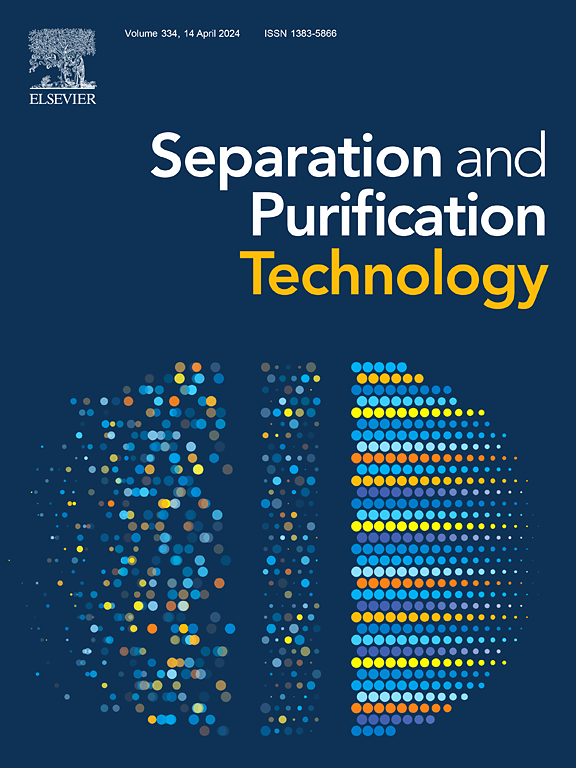Efficient desorption and energy-saving carbon capture using a nonaqueous primary alkanolamine-based biphasic absorbent
IF 8.1
1区 工程技术
Q1 ENGINEERING, CHEMICAL
引用次数: 0
Abstract
The nonaqueous biphasic absorbent was a great choice to overcome the difficulties of high energy consumption and lower desorption efficiency in carbon dioxide (CO2) regeneration processes of traditional chemical absorbents. In this work, a poly-ether solvent poly(oxymethylene) dimethyl ethers (PODE3-5) was introduced as phase separation agent in the anhydrous solution of primary amine 2-(2-aminoethoxy) ethanol (DGA) and dimethyl sulfoxide (DMSO). The optimal DGA/PODE3-5/DMSO biphasic absorbent could have a CO2 capacity of 0.60 mol/mol, with 94.2 % of the charged CO2 concentrated in the lower phase that representing only 48.1 % of the total liquid volume. And the DGA/PODE3-5/DMSO biphasic absorbent had a high CO2 desorption efficiency of up to 90 % in 30 min and a stable cycling capacity of 0.54 mol/mol. Further, the products and reaction mechanism of CO2 absorption process were analyzed based on the results of 13C NMR. The phase separation was triggered by the polarity enhancement of products and the affinity difference to products between PODE3-5 and DMSO. Particularly, the regeneration energy requirement of the DGA/PODE3-5/DMSO biphasic absorbent was 1.90 GJ ton-1 CO2, which is 51.1 % less than 30 wt% MEA-H2O solution.
使用基于非水一级烷醇胺的双相吸收剂实现高效解吸和节能碳捕获
非水双相吸收剂是克服传统化学吸收剂在二氧化碳(CO2)再生过程中能耗高、解吸效率低等困难的最佳选择。在这项研究中,引入了聚醚溶剂聚(氧亚甲基)二甲醚(PODE3-5)作为伯胺 2-(2-氨基乙氧基)乙醇(DGA)和二甲基亚砜(DMSO)无水溶液中的相分离剂。最佳的 DGA/PODE3-5/DMSO 双相吸收剂的二氧化碳容量为 0.60 摩尔/摩尔,94.2% 的带电二氧化碳集中在下相,仅占总液体体积的 48.1%。DGA/PODE3-5/DMSO双相吸收剂在 30 分钟内的二氧化碳解吸效率高达 90%,循环容量稳定在 0.54 摩尔/摩尔。根据 13C NMR 的结果,进一步分析了二氧化碳吸收过程的产物和反应机理。产物的极性增强和 PODE3-5 与 DMSO 对产物的亲和力差异引发了相分离。特别是,DGA/PODE3-5/DMSO 双相吸收剂的再生能量需求为 1.90 GJ 吨-1 CO2,比 30 wt% 的 MEA-H2O 溶液低 51.1%。
本文章由计算机程序翻译,如有差异,请以英文原文为准。
求助全文
约1分钟内获得全文
求助全文
来源期刊

Separation and Purification Technology
工程技术-工程:化工
CiteScore
14.00
自引率
12.80%
发文量
2347
审稿时长
43 days
期刊介绍:
Separation and Purification Technology is a premier journal committed to sharing innovative methods for separation and purification in chemical and environmental engineering, encompassing both homogeneous solutions and heterogeneous mixtures. Our scope includes the separation and/or purification of liquids, vapors, and gases, as well as carbon capture and separation techniques. However, it's important to note that methods solely intended for analytical purposes are not within the scope of the journal. Additionally, disciplines such as soil science, polymer science, and metallurgy fall outside the purview of Separation and Purification Technology. Join us in advancing the field of separation and purification methods for sustainable solutions in chemical and environmental engineering.
 求助内容:
求助内容: 应助结果提醒方式:
应助结果提醒方式:


